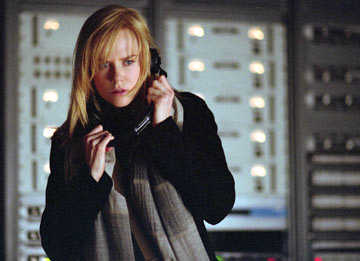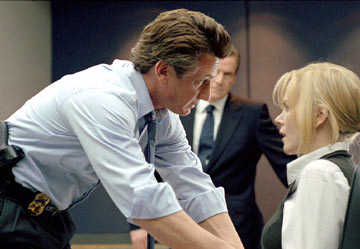

After a period of six years away from the director's chair, Academy Award winning director Sydney Pollack returns with The Interpreter, a taut, well-paced thriller much along the lines of Three Days of the Condor or The Firm, rather than his last tepid outing, Random Hearts. Pollack (Sabrina) is a seasoned veteran who knows how to craft a good movie, and all his skills are on display here. The Interpreter is a contemporary thriller rooted in the political turmoil of Africa. Silvia Broome (Nicole Kidman, Birth, The Stepford Wives), an interpreter for the United Nations, overhears a conversation hinting at the assassination of President Zuwanie of the fictional country of Matobo.
There are three rival factions in warring Matobo. Zuwanie (Earl Cameron, Revelation, Deja Vu) is the man responsible for the liberation of the country years ago, but like many African leaders, as he continued to serve, became more of a dictator. He is on his way to the United Nations to make a speech, while the Security Council is discussing whether to bring charges of crimes against humanity upon him. Broome overheard the conversation late at night, when she returned to retrieve some personal effects. She was in the interpreter's booth, and heard whispering in Ku, a fictional central African dialect understood by few. Tobin Keller (Sean Penn, The Assassination of Richard Nixon, 21 Grams) is one of the Secret Service Agents assigned to protect Zuwanie. He is extremely skeptical of Broome's story, and even considers her a suspect.
While The Interpreter is a film about trying to stop an assassination, it is also one about trust. Both Broome and Keller are extremely damaged people who need to learn how to open up. Broome came to work at the UN because she believes in "quiet diplomacy" instead of violence. She has a past, and refuses to divulge much of it. This is probably the worst element of the film. Broome continues to stonewall Keller and Dot Woods (Catherine Keener, The Ballad of Jack and Rose, S1m0ne) despite the fact that telling them everything would improve her chances of safety. Keller is still reeling from the death of his wife two weeks ago. He's terse, gruff, and will not tolerate anything that gets in his way, yet he still is logical enough to realize when he is wrong. Penn and Kidman are two of the better actors working today. The Keller role is the type of role that Penn excels at - one where a character internalizes all of his emotions, blocking anybody else out.
Broome believes that whoever is plotting the assassination is also trying to kill her. Keller discounts this initially, but it soon becomes apparent that somebody is trying to kill her. The further he investigates, the larger the conspiracy becomes. At the same time, he learns more about Broome, none of it good. It becomes a test of wills between the two. Broome wants to stop the assassination, but has other hidden intentions she refuses to reveal. Keller wants to stop the assassination and protect Broome, but he knows she is lying about something. As they spend more time together, Keller and Broome realize that their lives were both touched by tragedy, and this allows them to come to an understanding with each other. Thankfully, this does NOT involve a romantic subplot between the two of them.
Pollack received permission to film inside the actual United Nations (the first time a film had permission to film inside), lending an incredible amount of authenticity to the film. Sure he could build a set, but it just wouldn't feel the same. Moreover, the General Assembly itself is cavernous, and has a cinematic scope to it. One surprising element of The Interpreter is that it is good despite having three people credited with the screenplay, Charles Randolph (The Life of David Gale), Scott Frank (Minority Report, Flight of the Phoenix), and Steven Zaillian (Gangs of New York, Hannibal), and two with story credit, Martin Stellman (Tabloid, For Queen and Country) and Brian Ward (Tabloid). The script is not as smart as it thinks it is, but still succeeds because it tries to lay everything out. There are chase sequences and shootouts, but there is also lots of dialogue and character development.